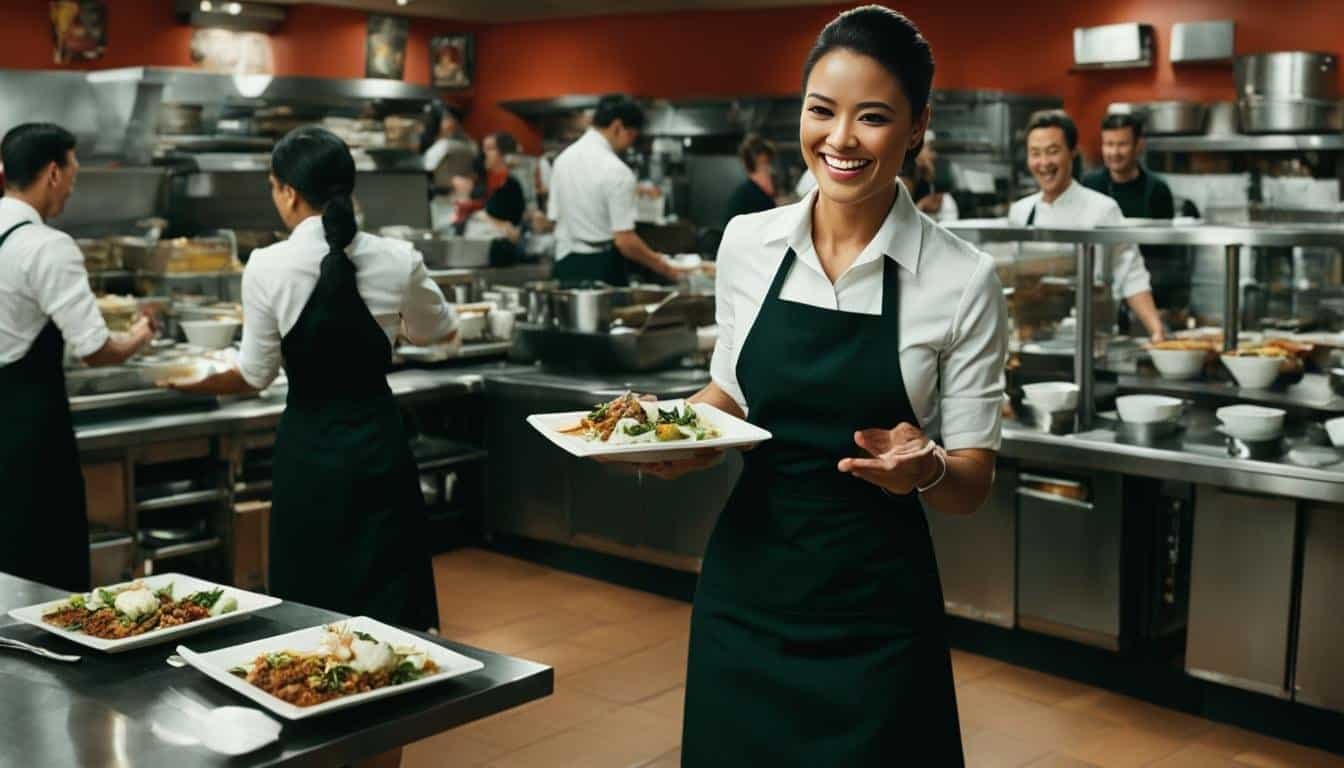Skills from Waitressing for a Resume
Waitressing is a job that requires a diverse range of skills, making it an excellent opportunity to develop valuable qualities that can enhance a resume. From customer service to time management, multitasking to problem-solving, waitressing equips individuals with essential abilities that are sought after in various industries. In addition, strong communication skills, attention to detail, and knowledge of the food and beverage industry are key components of a successful waitressing career.
Waitressing skills are highly transferable, and they demonstrate a candidate’s ability to thrive in dynamic environments, handle multiple responsibilities with efficiency, and provide exceptional customer service. These skills make waitresses well-rounded professionals with the versatility to adapt and succeed in various roles.
Key Takeaways:
- Waitressing develops valuable skills for a resume
- Customer service, time management, and multitasking are essential waitressing skills
- Communication skills and attention to detail are crucial in the food and beverage industry
- Waitressing skills highlight adaptability and problem-solving abilities
- Knowledge of the food and beverage industry adds value to a candidate’s resume
Key Skills for Waitressing
Waitressing requires a unique set of skills that are essential for success in the food and beverage industry. Whether you’re working in a bustling restaurant or a cozy cafe, mastering these key skills will help you excel in your role. Here are the essential skills every waitress should possess:
- Customer Service: Providing excellent customer service is at the core of waitressing. It involves being friendly, attentive, and anticipating the needs of the customers. Going the extra mile to ensure a positive dining experience is crucial.
- Time Management: With multiple tables to serve and various tasks to juggle, effective time management is essential. It means being able to prioritize tasks, meet deadlines, and deliver prompt service.
- Multitasking: Waitressing requires the ability to handle multiple tasks simultaneously. From taking orders and refilling drinks to delivering food and processing payments, being able to multitask efficiently is critical.
- Communication Skills: Clear and effective communication is crucial as a waitress. This involves interacting with customers, taking orders accurately, and communicating with the kitchen staff and other team members to ensure seamless operations.
- Problem-Solving: In a fast-paced environment, problems may arise unexpectedly. Waitresses need to be quick on their feet and able to think critically to resolve any issues or conflicts that may arise.
- Teamwork: Collaboration and cooperation are key ingredients in the success of a restaurant. Waitresses must work well with the kitchen staff, bartenders, and other colleagues to ensure smooth service and a positive work environment.
- Attention to Detail: Paying close attention to detail is essential to meet customer preferences, serve accurate orders, and maintain cleanliness and hygiene standards.
- Knowledge of the Food and Beverage Industry: Being familiar with different types of food, ingredients, and the menu allows waitresses to provide accurate recommendations, answer customer questions, and offer a seamless dining experience.
Mastering these skills will not only make you a valuable asset in your waitressing role but also equip you with transferable skills that can benefit your future career endeavors.
“The key to successful waitressing lies in balancing exceptional customer service with efficient time management and effective communication skills.”
| Skill | Description |
|---|---|
| Customer Service | Providing excellent service, anticipating needs, and ensuring customer satisfaction. |
| Time Management | Effectively managing time to prioritize tasks and provide prompt service. |
| Multitasking | Juggling multiple tasks simultaneously, such as taking orders, refilling drinks, and delivering food. |
| Communication Skills | Clear and effective communication with customers, colleagues, and kitchen staff. |
| Problem-Solving | Quickly resolving issues and conflicts that may arise during service. |
| Teamwork | Collaborating with colleagues to ensure seamless service and a positive work environment. |
| Attention to Detail | Paying close attention to detail to meet customer preferences and maintain standards. |
| Knowledge of the Food and Beverage Industry | Familiarity with different types of food, ingredients, and the menu. |
Waitressing Job Responsibilities
As a waiter or waitress, there are several important duties and responsibilities that you should be prepared to handle. These responsibilities not only focus on providing exceptional customer service but also ensuring efficient operations and maintaining a positive dining experience for customers. The key responsibilities of a waiter or waitress include:
- Providing excellent customer service: Waiters and waitresses are the face of the restaurant and play a crucial role in creating a pleasant dining experience for customers. This involves greeting and seating guests, taking their orders, serving food and beverages, and addressing any questions or concerns they may have.
- Adhering to timing standards for products and services: It is important to serve food and drinks in a timely manner, ensuring that customers are not left waiting for extended periods. This requires efficiently coordinating with the kitchen staff and maintaining a strong understanding of the menu and preparation times.
- Presenting the menu and making recommendations: Waiters and waitresses should be knowledgeable about the menu offerings in order to provide accurate and enticing recommendations to customers. This can involve sharing information about featured dishes, specials, or popular items.
- Serving customers in an accommodating manner: It is essential to create a welcoming and accommodating atmosphere for customers. This includes being attentive to their needs, ensuring any special requests are properly communicated to the kitchen, and addressing any issues that arise during their dining experience.
- Pre-busing tables: This involves clearing tables after customers have finished their meals, removing used dishes, and resetting the table for the next seating. Pre-busing helps maintain a clean and organized dining area and ensures a smooth dining flow.
- Looking for ways to avoid waste and limit costs: As a responsible waiter or waitress, it is important to be mindful of wastage. This can include correctly portioning food and beverages, minimizing the use of disposable items, and effectively managing leftovers.
- Handling cash transactions: Waiters and waitresses often handle cash payments from customers. This includes accurately processing payments, providing change when necessary, and keeping track of transactions to ensure accuracy and transparency.
- Ensuring accuracy in food orders: It is crucial to take accurate food orders from customers and transmit them correctly to the kitchen. This involves effective communication, careful attention to detail, and double-checking orders before serving them to customers.
- Maintaining a clean and safe work environment: Waiters and waitresses should contribute to the overall cleanliness and safety of the restaurant. This includes regularly cleaning workstations, tables, and dining areas, as well as following proper sanitation and hygiene practices.
By fulfilling these job responsibilities, waiters and waitresses play a vital role in ensuring a positive dining experience for customers and supporting the smooth operation of the restaurant.
Providing excellent customer service ensures a positive dining experience, while adhering to timing standards and making accurate menu recommendations can enhance customer satisfaction. Pre-busing tables and avoiding waste contribute to a clean and organized dining area, while accurate food orders and efficient cash handling demonstrate professionalism. Overall, the responsibilities of a waiter or waitress encompass a range of skills and tasks that require attention to detail, effective communication, and a commitment to exceptional service.
Essential Waitressing Skills
Waitressing requires a unique set of skills that are essential for success in the role. These skills not only contribute to excellent customer service but also ensure smooth operations and a positive work environment. Let’s explore some of the key skills that every waitress should possess:
1. Basic Math
Waitresses need to handle transactions accurately, including calculating bills, handling cash, and processing payments. Strong basic math skills are crucial to ensure that the financial aspect of the job is executed efficiently.
2. Verbal Communication
Effective verbal communication is vital for waitresses to interact with customers and coworkers. Clear and friendly communication helps ensure customers’ needs are met, orders are understood accurately, and any special requests or dietary restrictions are properly communicated to the kitchen.
3. Excellent Customer Service
Providing exceptional customer service is the cornerstone of waitressing. Waitresses must be attentive, friendly, and go above and beyond to meet customer expectations. Excellent customer service skills include attentiveness, a positive attitude, active listening, and a willingness to accommodate special requests.
4. Conflict Resolution
In a fast-paced environment, conflicts may arise. Waitresses should be skilled in resolving conflicts professionally and calmly. By effectively addressing customer complaints or misunderstandings, waitresses can maintain a positive dining experience for all customers.
5. Teamwork
Working well in a team is crucial for waitresses as they collaborate with kitchen staff, bartenders, and fellow waitstaff. Effective teamwork ensures smooth service, efficient communication, and a coordinated effort to provide a top-notch dining experience.
6. Thoroughness
Paying attention to detail is essential in waitressing. Waitresses must accurately take orders, serve food and drinks, handle check payments, and maintain cleanliness and hygiene. Thoroughness in these tasks ensures smooth operations and a high level of professionalism.
7. Professionalism
Waitresses represent the establishment they work for, and professionalism is key. This includes maintaining a neat appearance, following uniform guidelines, adhering to company policies, and exhibiting a courteous and helpful demeanor at all times.
8. Interpersonal Skills
Strong interpersonal skills are valuable for waitresses to build rapport with customers, understand their needs, and provide personalized service. Waitresses should be friendly, approachable, and capable of creating a positive and inviting atmosphere.
9. Dexterity
Waitressing often requires carrying plates, trays, and glassware. Having dexterity and coordination is essential to handle these items safely and efficiently, reducing the risk of accidents or spills that could impact customers’ experiences.
10. Adaptability
The restaurant industry can be unpredictable, with varying customer demands and changing circumstances. Waitresses need to be adaptable and flexible in their approach, ready to handle different situations with ease and maintain a high level of service.
These essential waitressing skills are highly valued by employers in the food and beverage industry. Aspiring waitresses should showcase these skills on their resumes and during interviews to demonstrate their ability to excel in the role.
Most Common Waitress Skills
When it comes to waitressing, there are several key skills that are essential for success in the role. These skills include both hard skills, which are specific technical abilities, and soft skills, which relate to interpersonal and customer service abilities.
Hard Skills:
- Taking and processing food orders accurately
- Food preparation and handling
- Processing customer orders efficiently
- Operating point-of-sale systems (POS) effectively
- Processing drink orders promptly
Soft Skills:
- Effective communication skills to interact with customers and coworkers
- Providing excellent customer service
- Paying close attention to detail
These hard and soft skills are crucial for waitresses to deliver exceptional service and ensure customer satisfaction. By mastering these skills, waitresses can provide a seamless dining experience for customers and contribute to the overall success of the establishment.
“As a waitress, it’s important to be able to handle multiple food orders accurately and efficiently. Attention to detail is crucial in ensuring that each customer’s order is prepared and served correctly.” – Sarah Johnson, Experienced Waitress
Transferable Skills for Entry-Level Waitresses
For entry-level waitresses, developing a strong skill set is essential for success in the role. While waitressing may seem like a temporary job, it provides valuable transferable skills that can benefit your future career. Highlighting these skills on your resume can make you a standout candidate in any industry.
Friendliness & Personability
Waitressing requires interacting with a diverse range of customers. The ability to be friendly, approachable, and personable is crucial for creating a positive dining experience. Building rapport with customers can lead to better tips and repeat business.
Written & Verbal Communication Skills
In a fast-paced restaurant environment, clear communication is key. Waitresses must effectively communicate with both customers and coworkers. Strong written and verbal communication skills help ensure accurate orders, efficient teamwork, and satisfied customers.
Collaborative & Interpersonal Skills
Waitressing often involves working as part of a team. Collaborative and interpersonal skills are essential for coordinating with fellow waitstaff, kitchen staff, and management. Being able to work well with others and navigate different personalities is crucial for a smooth dining experience.
Physical Stamina & Strength
Waitressing can be physically demanding, requiring long hours on your feet and the ability to lift trays or heavy plates. Physical stamina and strength are important for maintaining energy and providing excellent service throughout your shift.
Food Safety & Personal Hygiene
Adhering to food safety and personal hygiene standards is essential in the restaurant industry. Waitresses must understand and follow proper food handling procedures, maintain cleanliness in their personal appearance, and ensure the health and safety of both customers and coworkers.
By highlighting these transferable skills on your resume, you can showcase your ability to excel in a variety of roles. Whether you decide to continue in the food and beverage industry or pursue a different career path, the skills gained from waitressing can set you apart from other candidates.
Continue reading to learn more about the value of waitressing skills and how they can enhance your resume.
Conclusion
Waitressing provides valuable skills that can greatly enhance a resume. The diverse range of skills developed through waitressing, such as exceptional customer service, efficient time management, multitasking ability, effective communication, and problem-solving aptitude, make candidates well-rounded and adaptable in various roles and industries. By highlighting these skills on a resume, candidates can significantly stand out to potential employers.
Customer service is at the core of waitressing, as it involves delivering exceptional experiences to customers. This not only requires the ability to handle various customer needs and preferences but also to provide attentive and personalized service. Moreover, the fast-paced nature of the job cultivates strong time management skills, allowing waitresses to handle multiple tasks and prioritize efficiently to meet deadlines and deliver exceptional service.
The role of a waitress also demands effective communication with both customers and colleagues. Clear and concise communication is vital for accurately understanding and fulfilling customer orders, as well as for collaborating within a team to ensure a smooth and efficient dining experience. Additionally, waitressing often entails problem-solving on the spot, whether it’s addressing customer concerns or handling unexpected situations, which further enhances a candidate’s ability to think quickly and find solutions.
Furthermore, the meticulous attention to detail required in accurately taking and fulfilling orders, handling payments, and ensuring the cleanliness and safety of the dining area contributes to the development of strong organizational and detail-oriented skills. Additionally, the knowledge of the food and beverage industry gained through waitressing provides valuable insight and industry-specific expertise that can be applied in other roles within the hospitality or service sectors.







